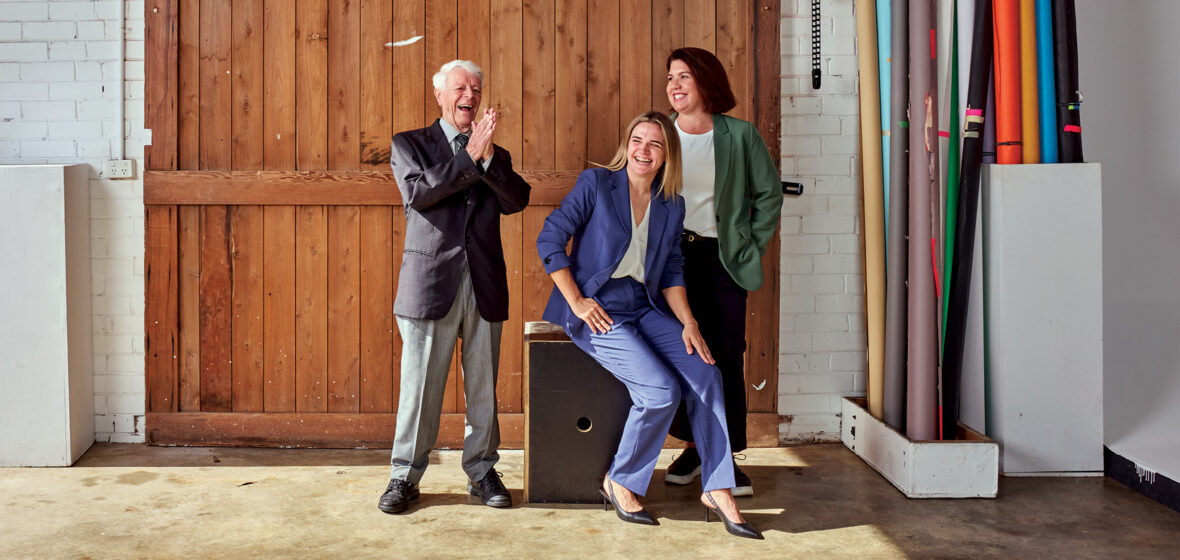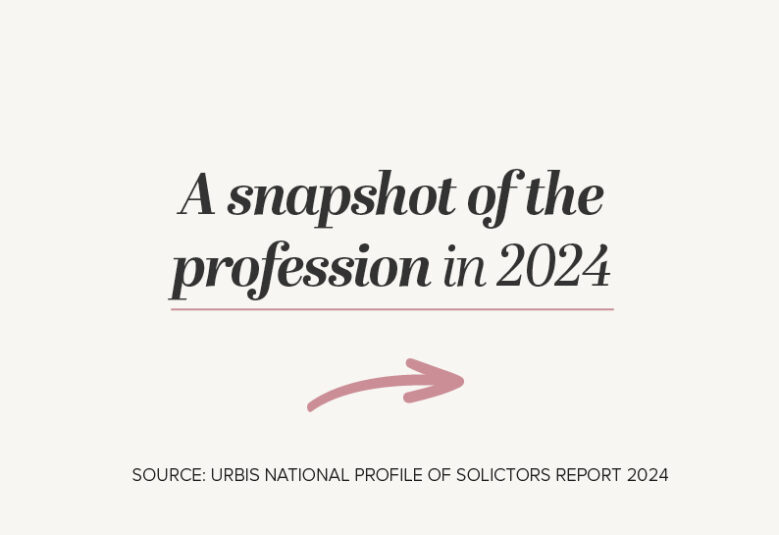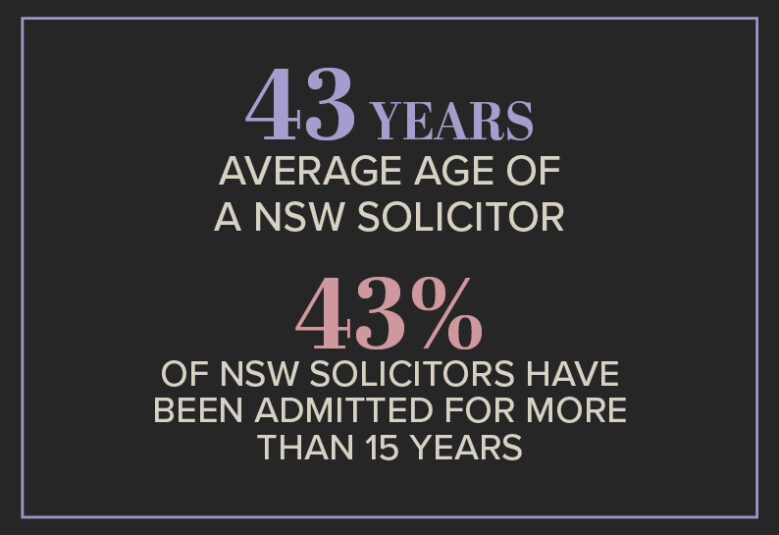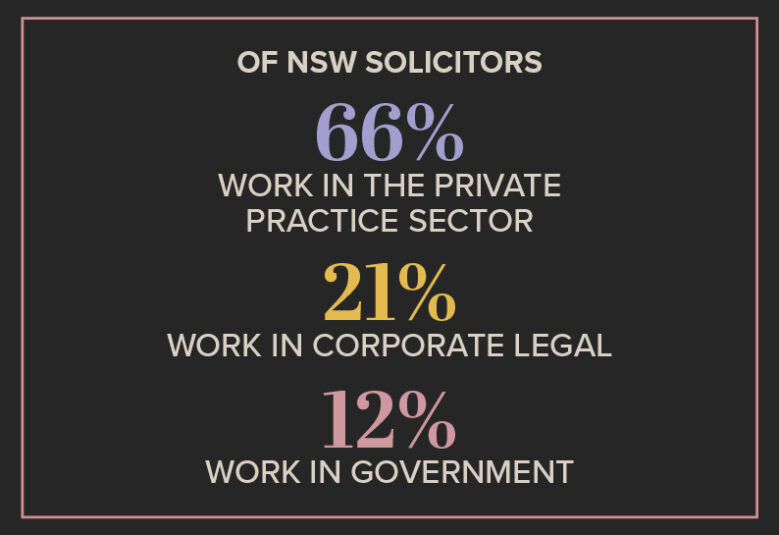Three outstanding lawyers. A combined 91 years of experience. Tucked inside a sun-drenched Wollongong studio, the Journal asks for their thoughts on an ever-shifting profession. Their answers may just surprise you.
Law is a noble, respected and prestigious profession steeped in tradition. As officers of the court, we are bound by ethics, principles of fairness, impartiality and transparency. These principles inform how we interact with judicial officers, fellow practitioners, clients and others in the legal system. With the advancement of new technologies and the rise of artificial intelligence, lawyers are increasingly expected to provide legal services in a speedy and efficient manner while providing accurate and cost-effective advice.
The challenge facing the profession is not just whether to adopt new technologies but how we can use them to streamline the way we practise law.
Speaking with three lawyers whose post qualification experience ranges from two years to almost seven decades, the practitioners reflect on how the law has evolved, what’s on the horizon, and how solicitors can embrace innovation by thinking ‘outside the box.’
A traditional and noble profession
As we embarked on the exercise of profiling this diverse trio, we consulted eminent jurist, former Justice of the High Court of Australia, the Hon. Michael Kirby AC CMG, about the role of lawyers in the 21st century. Is our role to maintain tradition or to adapt to change in light of new technologies? Kirby says that “[t]raditionally, law was resistant to innovation and radical thinking. Travelling beyond comfortable, predictable and previously authoritative expressions of the law is comparatively rare in Australia.”
Kirby points to the decision in Mabo v Queensland (No 2) [1992] HCA 23 (Mabo) as an example of the courts, within the confines of the law, handing down a decision ahead of its time. “The Mabo decision of the High Court of Australia in 1992 was timely and indeed overdue. But it could not have occurred without willingness on part of [the] High Court majority to ‘think outside the box.’
“At the time it was decided, Mabo was denounced by some lawyers as ‘heresy’. In law, grasping completely fresh ideas sometimes requires fresh thinking legislators, judges, advocates and academics.”

“When I started in law, there were no computers, there were no printers that you could use in the office. We used to copy the accounts going out with a press book tissue paper.”
In the three decades since Mabo was handed down, new technologies and innovative ways of thinking have seeped into all corners of the legal profession. Artificial intelligence, automated decision making, and hallucinations no longer belongs to science fiction.
For a new generation of lawyers, using mobile phones has always been the norm, information is readily accessible through the click of a button and artificial intelligence can draft anything from a letter to pleadings and court documents if you ask it to. With a career spanning almost seven decades, Harold Hanson of Hansons Lawyers has almost seen it all. When Marie Russo was admitted as a solicitor in 2023, Hanson had been a lawyer for 66 years.
Where tradition meets the new
Aged 93, Harold Hanson is one of the longest holders of a practising certificate in NSW history. Recently recognised by the Law Society for his 68 years of service, Hanson has witnessed significant changes to the profession since his admission in October 1957.
“I am not really so keen about black letter law … it can be overdone … I used to think two things: one, law was, by large part, applied common sense. That’s garbage. [S]econdly, laws are made by pollies and therefore you’ve got to really read them to understand them and to make sense of them,” says Hanson.
Hanson recounts the early days of his career when he used to subscribe to a service that provided copies of all legislation in NSW at the time. Statutes were collated in ‘greenback statutes.’ After a couple of months, the service stopped sending him copies. Hanson called the government printer to ask why and was told that the printer had given up trying to print every piece of legislation that was coming out. “There was just too much produced … that really paid to my thought that they’re going to run out of thinking up new legislation … that also is garbage,” says Hanson.
Hanson observes that new legislation is being passed in larger quantities and new areas of law are rising in successive waves. “Family law is an industry. Strata law is now an industry. [It is] a fairly new one that tracks the last 20 odd years but there are now people specialising in just family law [or] strata law and it’s an indication of how society is changing and changing quite rapidly,” he says.
Hanson believes all lawyers should specialise in an area of law. “I’ve done a wealth of conveyancing. I was fortunate to be able to specialise in various large subdivisions between North Wollongong and Kiama. A lot of West Dapto and a lot of Albion Park,” he says.
Hanson’s advice for students is to specialise in an area of law and to be known for that specialisation. “Otherwise, you’re a risk to your clients and yourself because law is not applied common sense,” he says.
Evolution in the way we practise law and deep-rooted traditions
Unlike Russo, who is part of a generation that grew up with mobile phones and the internet, Hanson remembers a time where everything was done by hand. “When I started in law, there were no computers, there were no printers that you could use in the office.
“We used to copy the accounts going out with a press book tissue paper. The bill was typed up with a special piece of copy paper in there and then you press that in a book with a damp cloth,” says Hanson.
When he first arrived in Wollongong from Bega in the early 1960s, he did a lot of work in the Court of Petty sessions and the Magistrates Court. “I’ve got the utmost respect and admiration [for] magistrates. They get through a heap of work … and do it very efficiently and professionally,” he says.
Hanson’s main areas of specialty were conveyancing, probate, estate planning and commercial law matters, and he admits that he was never interested in debt recovery work. “If you want to waste time, start going to court … [I]n those days, there were no mobile phones. [Y]ou couldn’t readily communicate with the office if you went down to the Magistrates Court.

“I was lucky enough to start at a firm where two of the partners were female … one was in the family law area … she was a terrific role model and a mentor for me.”
“[Y]ou didn’t know whether you were going to get on … and you could waste an awful lot of time which you … couldn’t bill to the client,” he recalls. Today, it’s not uncommon to spot lawyers on their tablets, laptops or mobile phones responding to emails or doing work in between matters. Technology not only allows a legal practitioner to obtain instructions from the client or contact the office, it also allows them to research cases or pull up legislation. It’s now common for legal practitioners to bill clients for travel and waiting times.
Lorelle Longbottom, accredited mediator and former Family Law Chair and Vice President of the Wollongong District Law Society, has witnessed remarkable changes to the profession since she was admitted in 2004.
Longbottom says that prior to the COVID-19 pandemic, she practically lived at the court registry. “You were there … engaging with your clients face-to-face. You’re engaging with your colleagues face-to-face … the bench,” she says. Apart from final hearings and some interim hearings, most court events are now held online. “People recently have been saying to me, they feel like it’s more litigious because matters are settling less than they used.
“Before … you’d be face-to-face at court, you, engaging with your colleagues, and having discussions about matters before they’re being called on. [Y]ou’d often settle … [and] resolve issues.”
While online court appearances have reduced travel times for regional lawyers, early career lawyers are less able to observe advocacy and court skills.
Longbottom recalls when she first started out as a lawyer, you would turn up at court and observe other matters in the list being called. “[Y]ou’re not just observing your colleagues appearing in court and the way the court is dealing with the matters.
“You are also observing your colleagues’ interactions with other colleagues and just seeing what happens. You don’t see that anymore. You miss out on all of that,” laments Longbottom.
Changing landscape of the profession and the importance of building relationships
Reflecting on the changes since she started out in her legal career, Longbottom points out there weren’t many law firms in the Shoalhaven or Wollongong region with female partners. “You might have seen some female partners, but it certainly wasn’t dominant.
“I was lucky enough to start at a firm where two of the partners were female … one [was] in the family law area … [she] was a terrific role model … and a mentor for me,” she says.
Longbottom acknowledges the impact great mentors had on her career. She encourages the next generation of lawyers to build relationships with others in the legal system. “[F]oster your relationships with your colleagues, foster your relationships with the judicial officers … barristers, accountants, your clients.
“Being a family lawyer … probably other areas of law as well, is about managing relationships,” she says.
Longbottom has also noticed an increase in the number of small firms and sole practitioners. “When I was doing my practice management course, probably around 2010, you were noticing more boutique law firms starting up and that … change was very noticeable.”
She points to a change in the demographics of the law firms in the Illawarra region. “You don’t have [just] the big firms … you have a lot more smaller firms that are just practising maybe singular areas of law rather than general service law firms that do lots of different areas,” she says.
One of the most important changes Longbottom has observed has been family law reform, particularly around coercive control. “I think us as practitioners, and also judicial officers, have a much better understanding of family violence than … when I first started practising more than 20 years ago.
“[T]here’s a much greater understanding and a much deeper understanding of what family violence looks like, what are the features of family violence, and … what its impact might be on the victims of family violence,” says Longbottom.
Importance of mentorship
Marie Russo is grateful for the lessons she has learnt from the positive female role models in her life, both inside and outside of law. Having only started out in her career, Russo is hungry to learn. “One of the big things that stood out to me in mentoring was people’s emphasis on building relationships with my bosses,” she says.
Hanson agrees that relationships and understanding people is crucial for a successful career in law. “One of the most important things to do in law … [is] to get out into the community and mix with people. Very often lawyers become a bit cloistered,” he says .
On the day of the photoshoot for the Journal, the three practitioners meet for the first time at a studio in Wollongong. It doesn’t take long for Longbottom and Russo to establish that they have mutual acquaintances, and they are soon chatting like they have known each other for years.
Around midday, Russo needs to take a conference call and there was nowhere for her to do so privately. Thinking ‘out of the box,’ Longbottom steps in and offers her car. She even turns on the air conditioning so Russo is comfortable. “We have all been there,” Longbottom observes.
Horizons and new beginnings: future of the profession
While the legal profession has witnessed significant changes, Longbottom points out that some things do not change with time, such as client interaction. “You still have that personal engagement with your clients and that’s generally face-to-face. That doesn’t really change too much,” she says.
Hanson points out that being a lawyer is more than a job, it’s a profession. “You are a member of a profession. There’s pride in that. It’s also recognition of the fact that you can contribute to community.
“You have standing, lawyers are needed in society with its proliferation of law. You can provide assistance to support and improve [the] community. That’s equally important,” says Hanson.

“I think that people are sometimes fearful of going into this industry because of that perception that it is traditional and it’s stagnant. But I think technology sort of pushes along the line.”
What’s Hanson’s secret to such a long and successful career? “First of all, you’ve got to enjoy what you do. Secondly, it requires application and the time.” To him, consistency is the key. Hanson asks students, “what is a profession?” The answers are mixed, but Hanson cautions that income should not be the main motivation. “The main driver is not just [income] – it’s being a member of a profession to which are attached ethics, your duty is to your client but at the same time, you’ve got to be mindful of the ethics.”
Hanson stresses that the role of the lawyer is to present the “background reasoning,” and to present the best case for the benefit of the client. He draws a distinction between presenting and embellishing the facts. “You are not allowed to tell lies. You hope then it will be dealt with by the judge, arbitrator or referee in [a] consistent way. That’s the best you can do,” he says.
Lawyers should establish proper support networks whether it’s in the office or outside the office. “There are very few things you can do on your own. You need support. You need people to give you confidence,” he says.
As a profession, law is about the delivery of a service to your client. “First of all, when they come in to see you, don’t keep them waiting for an appointment.
“If they come in, their time is as valuable as yours … second thing is never go home without having replied to phone calls or inquiries…”
“I didn’t want to be bound by time. Your commitment is to your client and that commitment has got to be 100 per cent”
Hanson says he has never kept a timesheet in his life. His reason for this is simple. “I didn’t want to be bound by time. Your commitment is to your client and that commitment has got to be 100 per cent,” he says.
Hanson is impressed by how practitioners these days keep on top of the different types of communication tools. “You’ve got letters, you’ve got email, you’ve got texts, you’ve got other contacts coming in and people are more demanding these days.
“They expect a reply to an email virtually by return mail and it’s not possible to do that,” he says.
Instead of shying away from technology, Russo encourages people to be versatile, especially when it comes to new technology like AI. “The industry is changing. Sometimes you feel like you are [in] a bit of a vacuum.
“[W]hen ChatGPT and artificial intelligence came out, the recommendation was ‘avoid it at all costs….’
“Don’t fear it. Get to know it, understand it and use it. …within obviously the ethical perimeters,” says Russo.
With all the technological progress underway, Russo stresses that as lawyers, we must not forget our duties and accountability. “You can get lost in all the noise that’s happening all around you … but you’ve got to remember that we hold a position of privilege. It sounds very serious but it’s also a great honour.
“[I]f you do it well, then it’s very rewarding for both you and the clients and your community…,” she says.
Longbottom agrees and says the most rewarding aspect of her job is helping people. Whether it is in her capacity as a mediator or acting as a lawyer for parties, she says you are often seeing people at a really difficult time in their lives. “They’re vulnerable, they’re emotional. It’s a stressful time for them and what I really strive for is to get them away from the lawyers’ offices.
“It sounds terrible, but we get their matters resolved, and get them away from interacting with us and the profession as quickly as they can…”
“[W]e need to focus on them moving forward with their futures after they’ve resolved the issues that are in dispute,” she says.
Outside of the courtroom, Longbottom has advocated for better resources in Wollongong. She says that it’s important for the profession to be advocates. “[N]ot just for our clients, but also to advocate for different features of our profession.
“I don’t think it’s ok for us as a profession or a member of the profession to sit back and go, ‘well, we’ll just accept that’. I don’t think that’s ok.
“We are court officers, but we also act for clients, and we need to make sure that the clients have access to justice in a timely way,” she says.
However, Longbottom acknowledges that resources have become less of an issue for Wollongong as judicial officers are able to deal with matters from different locations. “Rather than having to deal with matters in person … we can access judicial officers who are sitting in Darwin for example,” says Longbottom.
Longbottom acknowledges that access to justice has been one of the areas that has benefitted from the advancements in technology. Before online court appearances were possible, people in remote areas would need to travel long distances to appear in court. “People who may have found it really difficult to travel … to appear in person can actually dial in from their homes and have better access to justice,” she says.
Another big issue in law is retention especially among those who are just starting out in their law career. Russo says she has seen lawyers leave the profession quickly and says that early career lawyers need mentorship especially in regional areas. “You’ve got to ride some of the waves to really understand what you’re dealing with because if you quit too early, you’re never really going to see it in full action.
“You also see that because people tend to change jobs … they won’t actually see a matter in its full throw from start to finish, which means they’ll only see the ugly part. They actually won’t see … when it’s enjoyable … or rewarding to be in,” she says.
“I think for young lawyers, it’s time to get excited, but it’s also time to think about outside the box.
“At university, it’s very traditional, you learn a lot about the content and not so much about the … practice of law…,” observes Russo.
Russo encourages the next generation of lawyers to keep going and persist in their legal careers. She says some of the many changes happening in society right now, are going to manifest in the law. “[W]hat that means for us is we’re going to have an awesome experience seeing those things come through,” predicts Russo.
“You also see that because people tend to change jobs … they won’t actually see a matter in its full throw from start to finish, which means they’ll only see the ugly part. They actually won’t see when it’s enjoyable”
“I think that people are sometimes fearful of going into this industry because [of] that perception that [it is] traditional and it’s stagnant. But I think technology sort of pushes along the line,” she says.
Russo is excited about what the future might hold for the profession because she senses that change is coming in terms of the types of issues that lawyers are required to deal with and how lawyers can, or are expected to, deal with these new issues.
She believes that skills like innovation, entrepreneurial mindsets, agility and creativity will all become crucial.From statutes printed in ‘greenback’ books, to guidelines for the use of artificial intelligence, the three practitioners we have profiled have revealed that the law is not stagnant and it is constantly evolving to keep up with the times.
What role do lawyers play in fostering innovation in law? To Kirby, “[s]ometimes, technology (e.g. AI) stimulates radical thinking. Sometimes, it is the lawyer’s individual commitment to justice that enlivens an imperative for innovation.
“In the face of clear rules of law, most judges and lawyers must obey the law and apply it. But that does not prevent the law expressing a contrary view.”
“If the lawyer is positioned in a tribunal with power to do so, the lawyer may have the power to change the expression of the law.”














